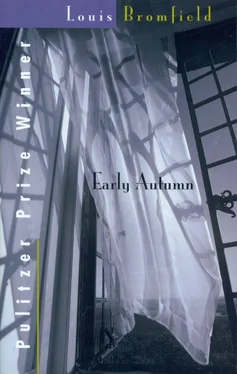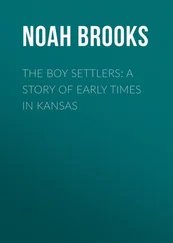As she put her mare over the low wall by the stables she looked up and chanced to see a familiar figure in rusty black standing in the garden, as if she had been there all the while looking out over the meadows, watching them. As she drew near, Aunt Cassie came forward with an expression of anxiety on her face, saying in a thin, hushed voice, as if she might be overheard, “I thought you’d never come back, Olivia dear. I’ve been looking everywhere for you.”
Aware from the intense air of mystery that some new calamity had occurred, Olivia replied, “I was riding with O’Hara. We went too far and it was too hot to hurry the horses.”
“I know,” said Aunt Cassie. “I saw you.” (“Of course she would,” thought Olivia. “Does anything ever escape her?”) “It’s about her. She’s been violent again this morning and Miss Egan says you may be able to do something. She keeps raving about something to do with the attic and Sabine.”
“Yes, I know what it is. I’ll go right up.”
Higgins appeared, grinning and with a bright birdlike look in his sharp eyes, as if he knew all that had been happening and wanted to say, “Ah, you were out with O’Hara this morning … alone. … Well, you can’t do better, Ma’am. I hope it brings you happiness. You ought to have a man like that.”
As he took the bridle, he said, “That’s a fine animal Mr. O’Hara rides, Ma’am. I wish we had him in our stables. …”
She murmured something in reply and without even waiting for coffee hastened up the dark stairs to the north wing. On the way past the row of tall deep-set windows she caught a swift glimpse of Sabine, superbly dressed and holding a bright yellow parasol over her head, moving indolently up the long drive toward the house, and again she had a sudden unaccountable sense of something melancholy, perhaps even tragic, a little way off. It was one of those quick, inexplicable waves of depression that sweeps over one like a shadow. She said to herself, “I’m depressed now because an hour ago I was too happy.”
And immediately she thought, “But it was like Aunt Cassie to have such a thought as that. I must take care or I’ll be getting to be a true Pentland … believing that if I’m happy a calamity is soon to follow.”
She had moments of late when it seemed to her that something in the air, some power hidden in the old house itself, was changing her slowly, imperceptibly, in spite of herself.
Miss Egan met her outside the door, with the fixed eternal smile which today seemed to Olivia the sort of smile that the countenance of Fate itself might wear.
“The old lady is more quiet,” she said. “Higgins helped me and we managed to bind her in the bed so that she couldn’t harm herself. It’s surprising how much strength she has in her poor thin body.” She explained that old Mrs. Pentland kept screaming, “Sabine! Sabine!” for Mrs. Callendar and that she kept insisting on being allowed to go into the attic.
“It’s the old idea that she’s lost something up there,” said Miss Egan. “But it’s probably only something she’s imagined.” Olivia was silent for a moment. “I’ll go and search,” she said. “It might be there is something and if I could find it, it would put an end to these spells.”
She found them easily, almost at once, now that there was daylight streaming in at the windows of the cavernous attic. They lay stuffed away beneath one of the great beams … a small bundle of ancient yellowed letters which had been once tied together with a bit of mauve ribbon since torn in haste by someone who thrust them in this place of concealment. They had been opened carelessly and in haste, for the moldering paper was all cracked and torn along the edges. The ink, violet once, had turned to a dirty shade of brown.
Standing among the scattered toys left by Jack and Sybil the last time they had played house, Olivia held the letters one by one up to the light. There were eleven in all and each one was addressed to Mrs. J. Pentland, at Pentlands. Eight of them had been sent through the Boston post office and the other three bore no stamps of any kind, as if they had been sent by messengers or in a bouquet or between the leaves of a book. The handwriting was that of a man, large, impetuous, sprawling, which showed a tendency to blur the letters together in a headlong, impatient way.
She thought at once, “They are addressed to Mrs. J. Pentland, which means Mrs. Jared Pentland. Anson will be delighted, for these must be the letters which passed between Savina Pentland and her cousin, Toby Cane. Anson needed them to complete the book.”
And then it occurred to her that there was something strange about the letters—in their having been hidden and perhaps found by the old lady downstairs and then hidden away a second time. Old Mrs. Pentland must have found them there nearly forty years ago, when they still allowed her to wander about the house. Perhaps it had been on one of those rainy days when Anson and Sabine had come into the attic to play in this very corner with these same old toys—the days when Sabine refused to pretend that muddy water was claret. And now the old lady was remembering the discovery after all these years because the return of Sabine and the sound of her name had lighted some train of long-forgotten memories.
Seating herself on a broken, battered old trunk, she opened the first of the letters reverently so as not to dislodge the bits of violet scaling-wax that still clung to the edges, and almost at once she read with a swift sense of shock:
Carissima,
I waited last night in the cottage until eleven and when you didn’t come I knew he had not gone to Salem, after all, and was still there at Pentlands with you. …
She stopped reading. She understood it now. … The scamp Toby Cane had been more than merely a cousin to Savina Pentland; he had been her lover and that was why she had hidden the letters away beneath the beams of the vast unfinished attic, intending perhaps to destroy them one day. And then she had been drowned before there was time and the letters lay in their hiding place until John Pentland’s wife had discovered them one day by chance, only to hide them again, forgetting in the poor shocked mazes of her mind what they were or where they were hidden. They were the letters which Anson had been searching for.
But she saw at once that Anson would never use the letters in his book, for he would never bring into the open a scandal in the Pentland family, even though it was a scandal which had come to an end, tragically, nearly a century earlier and was now almost pure romance. She saw, of course, that a love affair between so radiant a creature as Savina Pentland and a scamp like Toby Cane would seem rather odd in a book called “The Pentland Family and the Massachusetts Bay Colony.” Perhaps it was better not to speak of the letters at all. Anson would manage somehow to destroy all the value there was in them; he would sacrifice truth to the gods of Respectability and Pretense.
Thrusting the letters into her pocket, she descended the dark stairway, and in the north wing Miss Egan met her to ask, almost with an air of impatience, “I suppose you didn’t find anything?”
“No,” said Olivia quickly, “nothing which could possibly have interested her.”
“It’s some queer idea she’s hatched up,” replied Miss Egan, and looked at Olivia as if she doubted the truth of what she had said.
She did not go downstairs at once. Instead, she went to her own room and after bathing, seated herself in the chaise lounge by the open window above the terrace, prepared to read the letters one by one. From below there arose a murmur of voices, one metallic and hard, the other nervous, thin, and high-pitched—Sabine’s and Aunt Cassie’s—as they sat on the terrace in acid conversation, each trying to outstay the other. Listening, Olivia decided that she was a little weary of them both this morning; it was the first time it had ever occurred to her that in a strange way there was a likeness between two women who seemed so different. That curious pair, who hated each other so heartily, had the same way of trying to pry into her life.
Читать дальше












